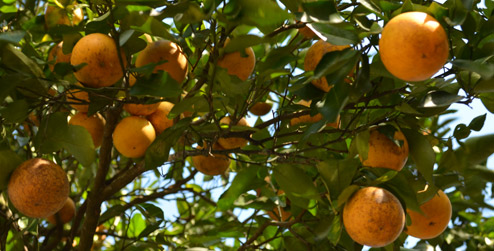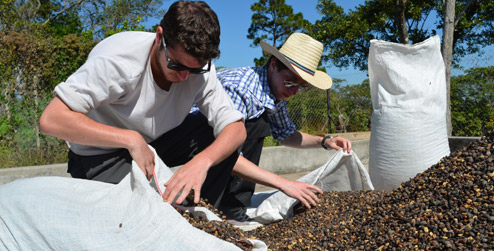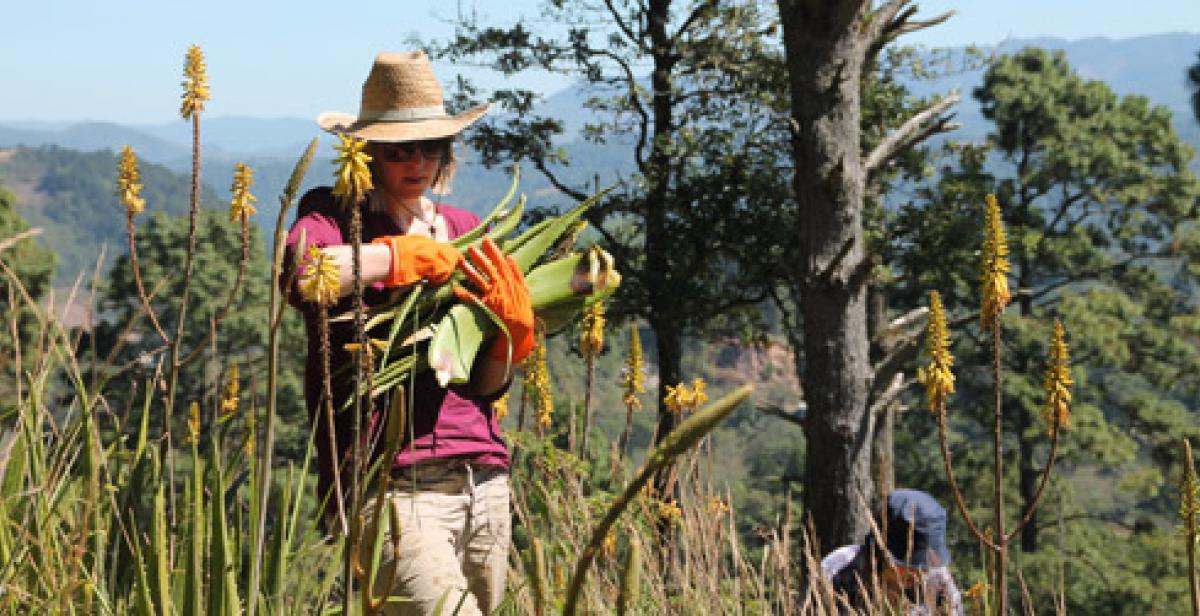Over the past month we have been working hard in the fields on several different stages of various processes with our partner organisation, COMUCAP, specifically dealing with aloe vera, oranges and coffee. Our task has been to work alongside the local men and women and learn how to operate the necessary tools safely and imitate the methods they employ. This way we can be left to our own devices, work more effectively and take minimal time away from those kind enough to be teaching us their way of life.
However, as we have found here, factors such as the weather and plague can seriously undermine both the size and quality of the harvest, and thus the quantity of output and market value. Unfortunately it is these uncontrollable circumstances that often affect the economies of developing countries and with no financial safeguards in place from the government, the poorest people inevitably suffer the most. It is these such people we are trying to help in conjunction with our cooperative, COMUCAP.
The work has been varied and at points arduous, but consistently rewarding. We have been deployed with machetes to hack away overgrown jungle to clear space for aloe vera plants to grow; high intensity and physically demanding, but perhaps not the most precise. In contrast, when picking the leaves themselves off the aloe vera plants we have had to be very calculated and steady. First of all squeezing the individual leaves to see if they have enough gel, then picking three such leaves and finally making a small incision at the bottom, tearing the leaf from the stem. Nevertheless, any leaf with a blemish, knife mark, broken tip, or even a slight tear at the base will be discarded and left to waste. It is these fine margins that define profit or loss for a whole season’s work.
Unfortunately due to a ‘bad season’ (mainly due to variable and unprecedented weather conditions) the associate farmers have not been able to produce oranges of a high enough quality for general sale this year. This meant that our work in the one orchard unaffected by the weather would count for the whole production of orange wine this season. In total we managed to pick 3,000 oranges, and peel over 1,100, resulting in enough juice for just less than 100 bottles of wine. With the right equipment or with some technical expertise this process could be made more efficient, however with Honduras being third on the list of countries most susceptible to climate change, there is a concern that in the future production will simply not be cost effective enough to continue.

Producing coffee takes priority in Marcala each season due to the length of time and exactitude it takes to create a high quality product worthy of a suitable price on the international market. Although there is next to no wastage along the whole production line, plagues such as ‘roya’ or ‘leaf rust’ can catastrophically harm coffee bean yields and the only injection of money comes at the end of the season (when the beans have been sold). This results in most of the workers going without food during the long working day and children of all ages are a common sight in the fields as schooling takes a backseat. The Western market also now craves ‘Fair Trade' or ‘Organic’ produce, but unfortunately there is still a deep seeded mistrust in the developed world of Central America. Therefore a demand is made for costly verification and certification processes which near cripple the small scale producers and so far too often the trickledown profits are not seen by the average worker in the field.

In developing countries it is frequently the case that the workers at the end of the food chain are the first to rise in the morning and last to complain about their situation, but get hit the hardest by the system. It is no different here. Sometimes factors out of their control such as plague or the climate devastate the crops. Sometimes the system that they are part of is in place to keep the wealthy happy and those in poverty in a perpetual struggle. Sometimes lending a hand is all you can do to help, but sometimes hearing about and seeing another’s plight is enough to inspire change in others.
Progressio ICS volunteer James Martin blogs from Honduras about oranges, coffee and Fairtrade.
Top photo of Progressio ICS volunteer Katie Sims collecting Aloe Vera, photo 2, a shot of an orange grove, and 3: Progressio ICS volunteers James Martin and James Hardy collecting coffee beans.



